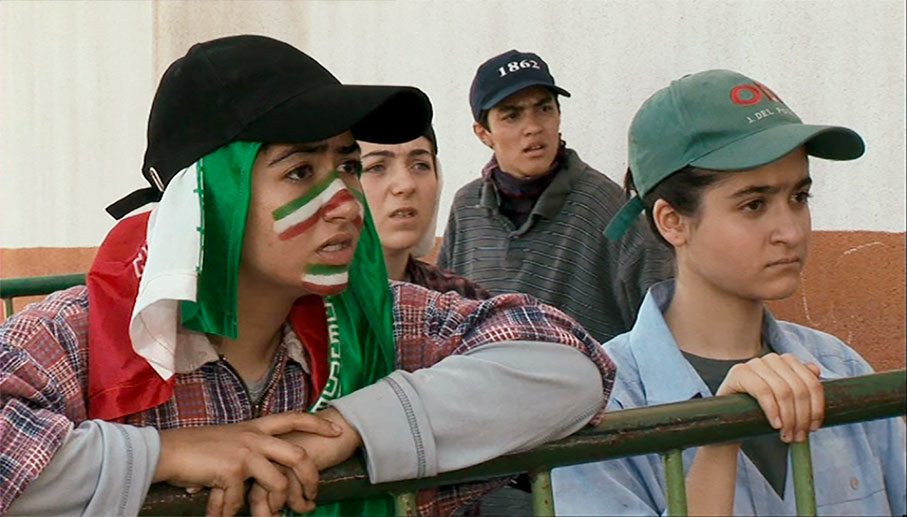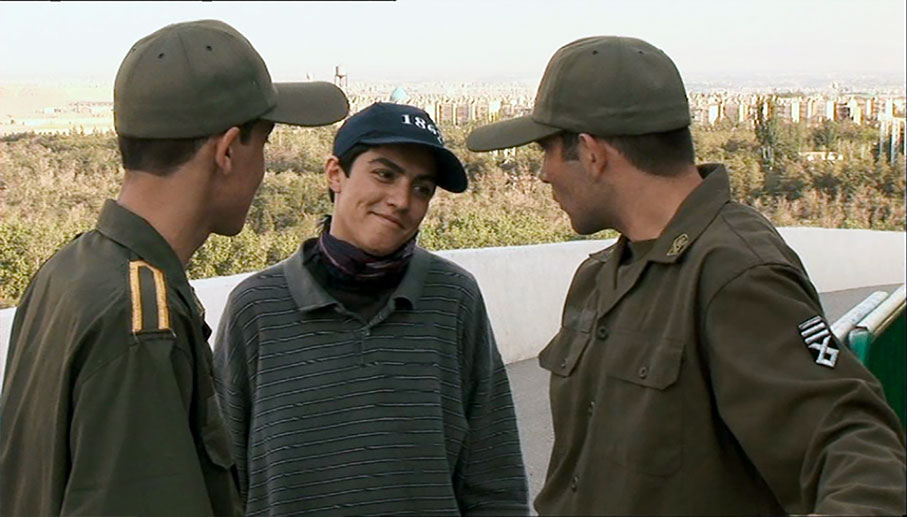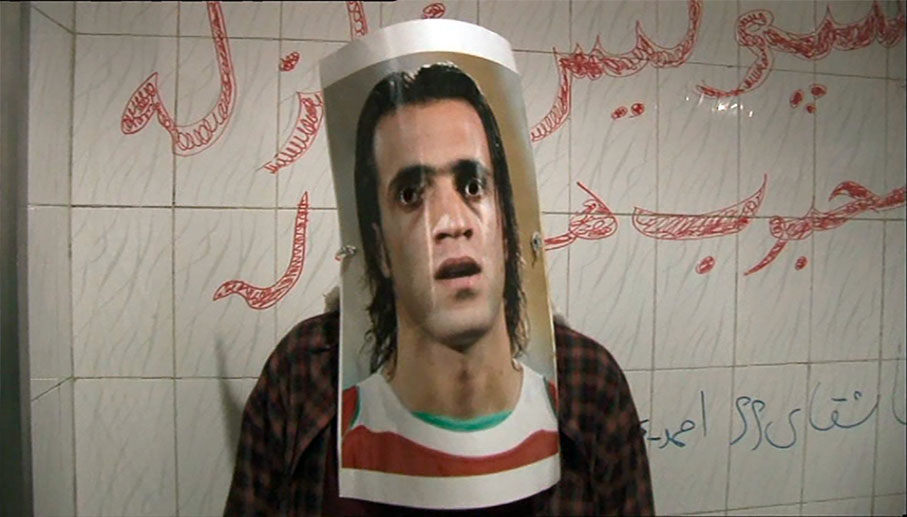|
If
you've been following Iranian cinema in recent years – and
you really should have – then the name Jafar Panahi should be familiar to you, probably for his 2000 film The
Circle, a compelling, cleverly structured but sobering
examination of the plight of women in modern day Iran. Those
who know that film may well be surprised by his latest venture,
or at least the prospect of it, a film based around football
and comedic in nature. Actually, the very idea
of a comedy film from Iran may well raise a few eyebrows,
given Iranian cinema's fascination with small, serious-minded
stories, often carrying a social, political or humanitarian
message. But Panahi is not first through the gate here –
just two years ago Kamal Tabrizi ran into a little trouble
on home turf when he poked fun at his country's clerical figures
and customs in The Lizard [Marmoulak].
And before you go expecting a Middle Eastern Carry on
Football, you should know that Offside
has a lot more in common with The Circle
than you might initially expect.

The
film opens in typical Iranian style, on a single, uninterrupted
shot of a male passenger in the back seat of a cab conversing
with a driver who is never shown. The man is chasing after
his daughter, who has gone off on her own with the intention
of attending a match that could see Iran qualify for the
World Cup for the first time in eight years. His mission
is to stop her and take her back home, because in this rigidly
patriarchal society, women are forbidden entry to professional
football matches. The man persuades the taxi driver to pull
up in front of a bus carrying supporters to the match, but
his daughter is not on board. When the taxi scurries off
without him, he hitches a ride on the bus, hoping to find
his daughter at the stadium. As another busload of supporters
passes, he wonders aloud if she might be on that one.
As a matter of fact she is, sitting quietly by herself,
her face painted with the national flag, hoping to pass
off as a boy and not doing too well at it. One of her fellow
passengers points out that she looks a bit too girlie but
wishes her luck anyway, and a ticket tout at the grounds
ups his price outrageously to compensate for the risk he
claims he is taking by selling to her. She's barely through
the gates when she is nabbed and handed over to the young
military conscripts who have been charged with stopping
the likes of her from getting in to see the match. Her protestations
and pleas ignored, she is led up to a fenced-off area containing
three other female hopefuls and told she is to be held
there until the military supervisor arrives.
Iranian
cinema is rarely big on plot, preferring to concentrate
on character and situation, something it often excels at.
Offside is no exception, with the bulk
of the film focussed on the argumentative relationship that
develops between the girls and the young soldiers charged with guarding
them. This is smartly and sometimes delightfully handled,
the soldiers' initial position of authority increasingly
undermined by the arrival of a fiercely defiant and confrontational
girl (a spirited performance by Shayesteh Irani) who challenges
her captors on just about every point they make. She's quickly followed by another girl who has cheerfully dressed up in a soldier's uniform and
gained entry to the match, but whose over-confidence got
her nicked when she parked herself in the seat reserved for the Chief
of Police.
The
humour arises largely from the absurdity of the situation
the girls find themselves in. When the conversation inevitably
moves to the reasons for excluding women from the ground,
for example, the soldiers claim that it is because they
should not be subjected to the swearing that takes place
when men watch the game ("We promise not to listen!"
one girl pleads), language that both parties use here with carefree abandon. In the most bizarrely funny
scene, one of the girls is escorted to a male toilet ("There
are no toilets for women here!") wearing a life-sized
poster of a football player's face as a mask in order to
disguise her gender, then told to cover her eyes so she
will not be corrupted by the graffiti on the toilet walls.

If
the film's primary concern is the unequal status of women
in their own society, then it is also very much about the
unifying nature of the beautiful game. Initially a further
example of the male-female divide, it later, as the girls
and the soldiers listen anxiously to the final minutes of
the match on the radio in their van, becomes a social leveller,
pulling down the barriers between uncomfortable oppressor
and unwilling oppressed that both religion and state have
helped put in place. And you really don't have to be a football
fan to appreciate this – the sheer passion expressed by
both the characters and the film itself for the game is
remarkably infectious, leading to a final ten minutes consisting
largely of the celebratory joy of victory and the thrilling
sense of community and equality that results. Rarely, if
ever, has an Iranian film with serious political concerns
ended on a note of such euphoric optimism.
Naturalistically
performed and documentary-like in approach, there is a compelling
sense that we are watching events very much as they happen,
but the narrative is so well structured and individual scenes
so effectively executed that you just know this was planned
to perfection.* Even the title nicely reflects both of the
film's key concerns, a football term that makes allusions
to the women's position in their own society – as rigidly
enforced as any other, the offside rule famously remains
the hardest for those not familiar with the game to understand.
Framed
1.78:1 and anamorphically enhanced, the transfer here is
impressive for what was doubtless a low budget film and
shot on high speed stock (necessary for the later scenes in the police van at night). As a result the detail is not quite reference
quality and some fine film is visible, but this only seems
to add to the documentary feel of the visuals. Contrast
and colour are very good, and the picture has a very pleasing
look to it that always feels right for the film itself.

The
Dolby 2.0 soundtrack is surprisingly lively, with very good
stereo separation on sound effects, and the noise and atmosphere
of the stadium vividly evoked on our brief trip inside.
Not
much here, which is a real shame – I would have welcomed some
information on how some of the scenes here were set up and
filmed.
We
do have two textual extras. Jafar Panahi, Director
is a very brief biography and filmography, while the more
substantial and interesting Production Notes
are provided by Panahi himself.
As a confirmed devotee of Iranian cinema I am aware that I came
to this film with a degree of bias, but a more user-friendly
introduction to the pleasures offered by this country's
very distinctive cinematic style you'll be pushed to find.
Offside is a treat, a very human story
that questions its country's political and religious
doctrines, but does so with poignancy, intelligence and
humour. Artificial Eye's DVD is disappointingly light on
extra features, but the transfer is fine and for the film
itself this has to come warmly recommended.
* As it turns out (I did not realise this at the time the review was written) the film was actually shot at some speed during the qualifying match itself, which really is taking place in the stadium to which the girls have been denied entry. Thus the ending was effectively unwritten and largely improvised around the very real sports reports they are listening to. Had the Iranian team not won the match, who knows how the film might have concluded.
|